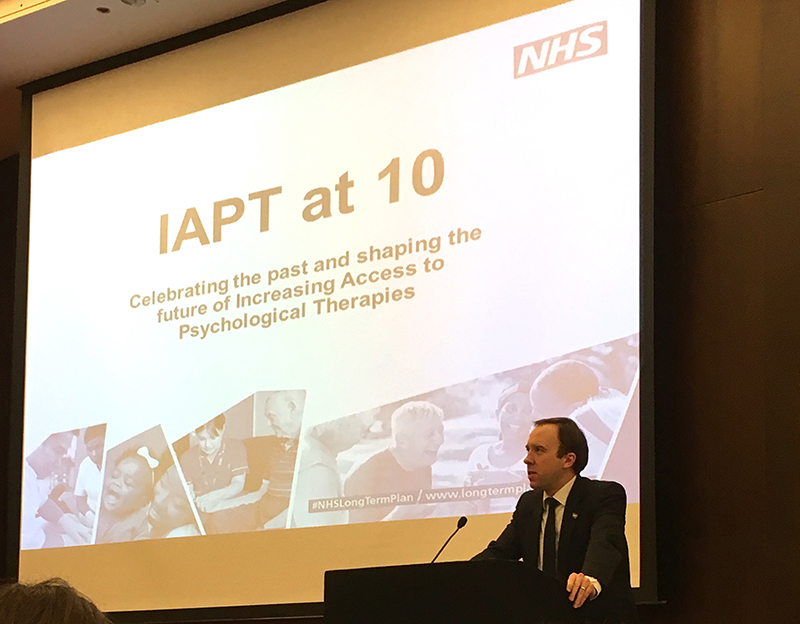
NHS England is celebrating the first ten years of IAPT and exploring the future shape of the programme. IAPT now treats more than one million people a year and has achieved patient recovery rates of 50%, with two-thirds or more showing a significant improvement.
The programme will continue to expand under the NHS Long Term Plan with an additional 380,000 adults and older adults with common mental health problems set to access IAPT services by 2023/24.
To recognise IAPT’s groundbreaking achievements, NHS England brought together service users, staff and those involved in the development of the programme itself at a celebratory event on 14 February. The conference was an opportunity to thank all those working in talking therapies for their contributions, with presentations from leading figures in government, the NHS England national team and IAPT teams.

The event kicked off with a thank you from Matt Hancock, Secretary of State for Health and Social Care who noted the remarkable achievements of IAPT. As well as celebrating these achievements, he called on IAPT services to recommit to action and continue the expansion of the programme, particularly for those with long term conditions (LTCs) such as chronic fatigue syndrome.
NHS England Chief Executive Simon Stevens acknowledged the contribution of the key figures behind the evolution of the programme, particularly Lord Richard Layard and Professor David Clark, and the strong evidence base that has been collected as a result. He called on those present to explore what the next five to ten years would look like, and highlighted the work needed to address the variable recovery rates across IAPT services and inequality in access to IAPT by groups such as older adults, males and BAME communities.
Members of the NHS England national team thanked IAPT teams, congratulating them on their achievements, and reminded the room of the guidance available in the IAPT Manual to support their work. Claire Murdoch, Director for Mental Health, confirmed her commitment to mental health remaining important at national level with assurance that the additional £2.3bn for mental health will include significant funding for the expansion of IAPT.
IAPT teams shared their learnings via presentations, workshops and posters on topics such as implementing IAPT LTC pilots, enhancing service user experience, and promoting workforce wellbeing.
Lord Layard spoke about the economic case that helped to secure initial national investment in IAPT. He highlighted that it is now recognised as a world leading programme, and attributed five factors to IAPT’s success:
- a clear objective to implement NICE guidelines
- a long term plan, achieved within six years
- a national commitment to quality standards and centralised monitoring
- outcome measurement as a key factor in gaining political support
- a focus on cost savings
IAPT is one of the most pioneering mental health services at scale anywhere, and across the world, others are looking to learn from the IAPT experience and evidence base. Professor Clark, National Clinical and Informatics Advisor for IAPT, gave examples of media coverage and interest in IAPT from countries including Norway, Sweden, Australia, Canada, USA and the Netherlands. He pointed to the level of public transparency in IAPT that doesn’t happen anywhere else in mental health in the UK or the rest of the world.
“In a unique exercise in public transparency, IAPT ensures that almost everyone (99%) who has a course of treatment has their anxiety and depression measured at the beginning and end of treatment.”
Professor Clark went on to highlight five challenges for IAPT in meeting the NHS Long Term Plan:
- growing the workforce
- maintaining quality standards
- establishing IAPT LTC services in all areas
- making greater use of digitally enabled therapy
- providing post treatment follow-up
For more on the evolution of the talking therapies programme and its future expansion, visit the IAPT at 10 webpage and read the blog by Professor David Clark. Join the conversation on twitter #IAPTat10.
